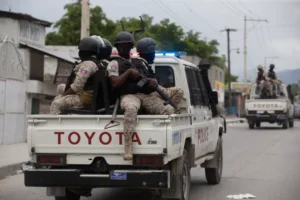As the Caribbean country of Haiti continues to suffer from economic and political unrest as well as violence, most of it fueled by organized criminal groups, Canada will send navy warships there to gather intelligence.

According to Trudeau, Haiti is currently dealing with continuous gang violence, political unrest, and corruption. “Now is the time to unite and face the gravity of this situation.”
The mission’s duration or the number of participating ships were not specified by the Canadian leader. The 15-member Caribbean trade organization, CARICOM, had a meeting when the announcement was made.
Leaders in Haiti, including Prime Minister Ariel Henry, have already asked the international community for military support to help stop the rising violence.
However, some Haitians have opposed these requests, pointing to their country’s lengthy and problematic history with foreign intervention.
Volker Turk, the head of the UN human rights office, also asked for an international force to assist in putting an end to the “living horror” that is the island last Friday.
Since the killing of former Haitian President Jovenel Moise in July 2021, Haiti’s gangs have experienced an increase in their authority. In December, the UN reported that gangs controlled 60% of Port-au-Prince, the nation’s capital.
A significant gasoline terminal in the capital was blockaded by the G9 Family and Allies for more than a month starting in September of last year, effectively shutting down much of the city’s commerce and causing a humanitarian crisis.
During the blockade, garbage accumulated and clean water became increasingly limited; as a result, Haiti reported its first incidence of cholera in nearly three years. Infections have exploded since that time.
Many Haitians are seeking asylum abroad because the situation there amid the turmoil have become intolerable for them.
The United States announced new regulations in January that would permit up to 30,000 people per month to enter from Nicaragua, Haiti, Venezuela, and Cuba as long as they adhere to a stringent set of criteria, including thorough vetting. However, the new policy would prevent Haitians from entering the US from Mexico.
Due to the hazardous situation in Haiti, the UN has warned nations not to return refugees and migrants there.
Thursday at CARICOM, Trudeau said that Haiti’s situation “weighs hard” on him. Additionally, he promised to provide $9.1 million in humanitarian aid and $7.4 million to help safeguard Haitian women and children near the country’s border with the Dominican Republic.
Despite opposition from throughout the world, tens of thousands of Haitians and persons with Haitian ancestry have been removed from the Dominican Republic during the past year.
Both the US and Canada have previously given military equipment to the Haitian government and imposed penalties on those suspected of having connections to organized crime or corruption in Haiti.
This strategy was kept up on Thursday when US Secretary of State Antony Blinken announced new sanctions against “five individuals and seven family members” who had connections to criminal organizations and “have threatened the livelihoods of the Haitian people and are blocking life-saving humanitarian support.”
Henry, the prime minister of Haiti, even recommended that the US and Canada take the helm of the planned international invasion. But neither nation has expressed interest in leading such a group.




